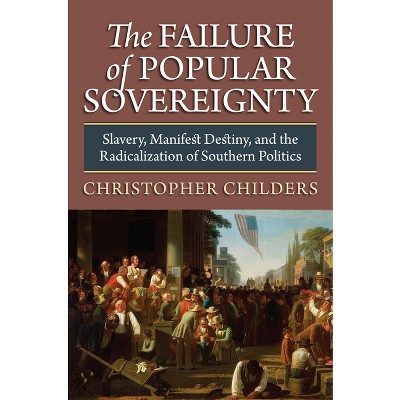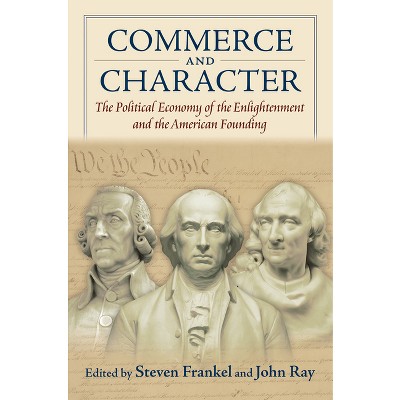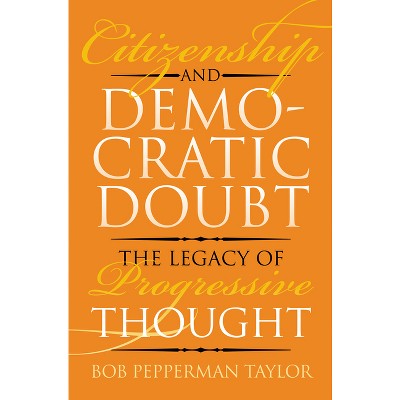Sponsored

Empire of the People - (American Political Thought) by Adam Dahl (Paperback)
In Stock
Sponsored
About this item
Highlights
- American democracy owes its origins to the colonial settlement of North America by Europeans.
- Author(s): Adam Dahl
- 272 Pages
- History, United States
- Series Name: American Political Thought
Description
About the Book
Empire of the People examines the constitutive role of settler colonialism in the historical construction of modern American democratic thought. It traces how the ideological disavowal of colonial dispossession and land appropriation established the conceptual and theoretical architecture of American democratic politics.Book Synopsis
American democracy owes its origins to the colonial settlement of North America by Europeans. Since the birth of the republic, observers such as Alexis de Tocqueville and J. Hector St. John de Crèvecoeur have emphasized how American democratic identity arose out of the distinct pattern by which English settlers colonized the New World. Empire of the People explores a new way of understanding this process--and in doing so, offers a fundamental reinterpretation of modern democratic thought in the Americas. In Empire of the People, Adam Dahl examines the ideological development of American democratic thought in the context of settler colonialism, a distinct form of colonialism aimed at the appropriation of Native land rather than the exploitation of Native labor. By placing the development of American political thought and culture in the context of nineteenth-century settler expansion, his work reveals how practices and ideologies of Indigenous dispossession have laid the cultural and social foundations of American democracy, and in doing so profoundly shaped key concepts in modern democratic theory such as consent, social equality, popular sovereignty, and federalism. To uphold its legitimacy, Dahl also argues, settler political thought must disavow the origins of democracy in colonial dispossession--and in turn erase the political and historical presence of native peoples. Empire of the People traces this thread through the conceptual and theoretical architecture of American democratic politics--in the works of thinkers such as Thomas Jefferson, Thomas Paine, Alexis de Tocqueville, John O'Sullivan, Ralph Waldo Emerson, Daniel Webster, Abraham Lincoln, Walt Whitman, and William Apess. In its focus on the disavowal of Native dispossession in democratic thought, the book provides a new perspective on the problematic relationship between race and democracy--and a different and more nuanced interpretation of the role of settler colonialism in the foundations of democratic culture and society.Review Quotes
"An important book that offers useful theory and impactful insight into how settler colonialism is integral not only to democratic theory in the United States but to other settler colonial nations too."--H-Net Reviews
"Empire of the People explicitly explicates the settler-colonialist subtexts beneath almost every aspect of post-1776 US politics and culture. Dahl contextualizes his use of Settler Colonial Theory by rereading older colonial theorists, and not only the oft-studied Locke and Rousseau, but also figures less known to Americanists, such as Edward Gibbon Wakefield."--Early American Literature
"Dahl outlines theories of colonial dispossession that facilitate the ideological obfuscation of conquest, a foundational violence that 'establishes the basis of democratic sovereignty.'"--Native American and Indigenous Studies
"A thought-provoking book."--Transmotion
"Dahl makes an important contribution to settler-colonial studies by providing an incisive, deeply informative, and thoroughly convincing 'ideological history' of the settler-colonial foundations of American democratic thought."--Journal of Interdisciplinary History
"Dahl presents a complex and intriguing theory of American historical development."--Choice
Empire of the People is a capacious tour de force. In a sweeping historical account, Dahl illuminates the violent structure of settler colonialism in the United States. The chapters explore, and powerfully unsettle, prevailing assumptions in American political thought, vividly taking stock of the narratives of native absence that underpin the democratic thought in the west. The book is an impressive contribution to the florescence of counter-narratives that are preparing new ground for an urgent and emergent political theory of decolonization.--Alexander Keller Hirsch, University of Alaska
"What if the foundation of democracy is not 'the people' but the dispossession of land from its rightful inhabitants? Adam Dahl transforms our understandings of American political thought, showing how it deliberately ignores Native American presence and practices. Dahl deftly illuminates how democratic theory--from Jefferson to Tocqueville to Emerson--cannot be separated from its settler-colonial roots. By turning to the Pequot theorist William Apess, Dahl identifies a solution--to take indigenous thinking and nations seriously as alternative, equal nations."--Kennan Ferguson, director of the Center for 21st Century Studies, University of Wisconsin-Milwaukee
"What is the relation between democracy and colonial dispossession? Adam Dahl critically examines this question through a close study of democratic theory in nineteenth-century Anglo-America. Bringing together familiar figures such as Emerson, Whitman, and Tocqueville with a complex array of lesser known texts and authors, Dahl expertly demonstrates how the US tradition of democratic thought was forged in and through the systematic expropriation of indigenous peoples from their ancestral lands. Most important and innovative, however, is his serious engagement with indigenous political thinkers, including William Apess, Black Hawk, and Elias Boudinot, who laid bare the paradoxes of this 'democracy dispossession.' As such, Empire of the People functions as both contribution to, and indictment of, American political thought."--Robert Nichols, McKnight Land-Grant Professor in Political Theory, University of Minnesota
Shipping details
Return details
Trending Non-Fiction











